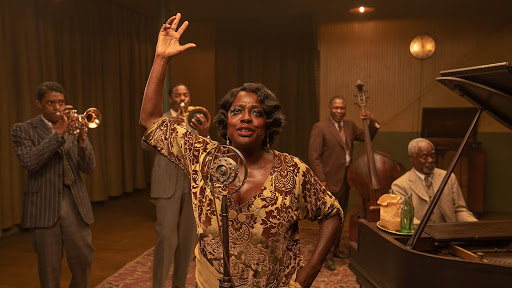Netflix’s Ma Rainey’s Black Bottom is adapted from two-time Pulitzer Prize winner August Wilson. Set in the 1920’s, the film stars Viola Davis as Ma, a real life Blues singer. Ma’s was a musical pioneer and inspired the works of a an abundance of artists, giving her the “Mother of Blues.”
On the surface, the film is a story about a group of artist coming together to record a song in Chicago, 1927. But underneath, the film explores the social injustices that are prevalent in society today. While this film is symbolic of the Black American experience in the early 20th century, it does well to shed light on the power and influence of the Blues.
The Blues, according to Producer Denzel Washington can be described as the Black individuals “[History, pain, and escape. It’s a desire for better. It’s a way of expressing our love for ourselves and each other and recognizing those who came before us and what they went through.]” This film is also an accurate portrayal of the Black experience as described in Washingtons’s meaning of the Blues.
Viola Davis shows great conviction and dedication to character. Her ability to deliver such a cathartic experience in her roles remains untouched. Not only did she connect emotionally and physically to the point of truly becoming Ma, but she has definitely shown us a little bit more of her range as an artist.
As Ma makes her way to her studio session, her car collides with another motorist. As her manager tries to smooth things down, she becomes surrounded by white men and women. Ma is blamed by the police officer, but she does not stand down. She continues to show tenacity while protecting her lover Dussie Mae (Taylour Paige). Ma shows us her strength and power in a society that tries to box her in.
As the band waits for Ma, they have discussions about their goals and aspirations. Levee (Chadwick Boseman) delivers a stellar performance in his last role. Levee is a trumpeter whose sense of pride gets in the way of his goals. He continues to try and open a locked door, which is symbolic of Levee’s misguided energy. Instead of seeking advice from his older and more experienced colleagues, he choses to act with bravado and impulsiveness. Which in turn, ends up causing him to be alienated from the very people who can help him achieve his goals. Once he finally breaks through the door using force, he finds himself trapped. Levee’s use of physical and verbal force to achieve his goals leave him stuck on a plateau, unable to move on in all aspects of his life.
The final frames show a group of males singing the song Levee wrote. While their version lacks soul, passion, and any connection to the material, the producer nods in approval. This sheds light on the heartbreaking gatekeeping Levee (and each artist in the film) experienced. The song was an ideal representation of Levee’s ego and youthful joy of music which would have been a completely different experience if he sang it.
Overall, the film was spectacular. The all-star cast delivered a wonderful take on the August Wilson classic. Check out this trailer and prepare to have your mind blown!






